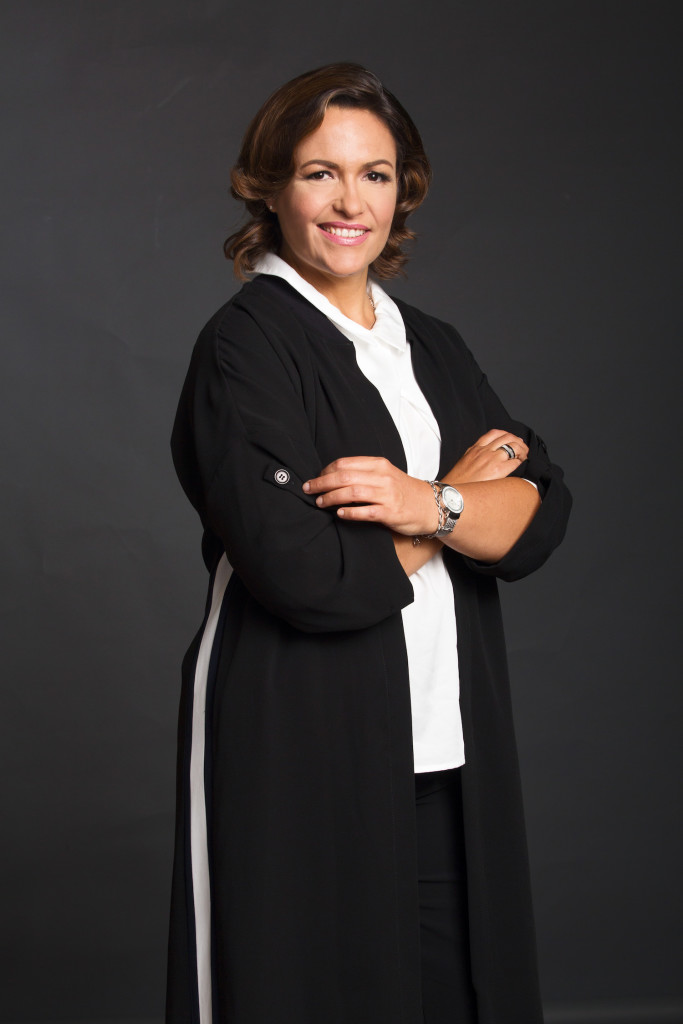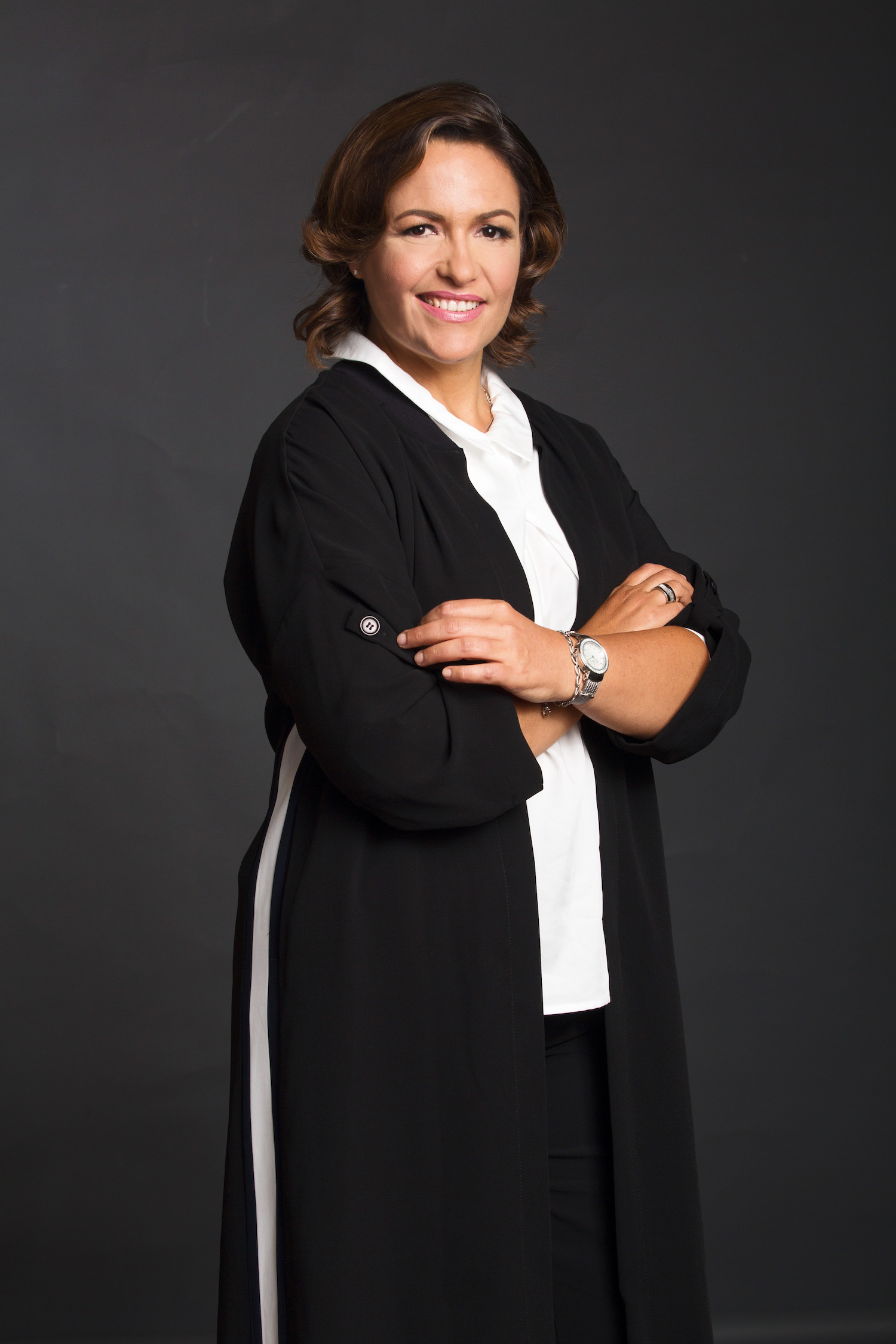By Isabella Olivares

Some heroes enter the battle with raised shields and swinging swords. Others enter the fray with shining ideals and an unparalleled sense of volunteerism — and they come out wiser, stronger and more determined than ever.
The journey is a central element in the story of a hero. He is called to venture off into some unfamiliar territory (usually with some assistance), where he overcomes the multiple trials that lead up to one final challenge or enemies, which he then defeats before returning from this adventure changed or transformed. Heroes from different literary and mythological cultures — like Odysseus, Perseus, and Beowulf — go through this kind of quest slaying monsters and outsmarting villains as they go.
In real life, CAMELEON founder and lauded humanitarian Laurence Ligier has gone through her own heroic journey. This time, the hero is a she.
But unlike her mythical counterparts, her enemies are not hydras or dragons. Her foes are the scourges of rape and sexual abuse in the Philippines, and her journey is far from over.
The call to the journey
Laurence’s journey to starting CAMELEON, a center for victims of sexual abuse and rape, started when she was just 20. Having grown up in Chalon-sur-Saone, France in relative comfort and privilege, she longed for an opportunity to do some good in the world. “I wanted to help people who didn’t have the chance to be born in the right place like I had,” she explains. “I chose to do a humanitarian mission, to visit a country not as a tourist, but to be useful for something.”
Laurence initially wanted to volunteer in Africa, but she soon discovered that joining a humanitarian mission wasn’t all that easy when you have no academic or professional qualifications. She eventually found a small non-governmental organization (NGO) that was willing to take her with its members on one of their missions. The catch? It was to a country that Laurence knew absolutely nothing about: the Philippines.
“It was my first trip!” Laurence reveals with a laugh. Little did she know that that first mission was just the beginning of her heroic journey.
In the Philippines, she interacted with the country’s poorest and most vulnerable sectors, from scavengers in Tondo to slum communities in Iloilo, to young girls living on the street. Many of these girls were victims of rape and sexual abuse often perpetrated by their own relatives. In order to help them even more, Laurence finished her Law degree in France before moving on to study NGO Management. She returned to the Philippines in 1997 to establish CAMELEON with a friend.
Running an NGO is never easy, and the early years were especially difficult for Laurence and CAMELEON. The CAMELEON center in Passi, on Panay Island, which can house about 50 beneficiaries at a time, took years to establish, and money and support weren’t always easy to come by. For starters, the topics of abuse, rape, and incest were — and still are — very much taboo in the country, to the point that many preferred to deny the possibility of it occurring as often as it truly does in Philippine society.
“It is very hard, especially at the beginning, for a foreigner, because they were saying that I exaggerated, there were few cases, etc. I had to go see the mayors, governors, and the media with the folders of all the girls to say, ‘See? I’m not inventing it.’” Laurence had better luck in Europe, where she won grants and met with businesspeople and donors. Among her supporters was Sister Emmanuelle, NDS, a famous humanitarian whose work in Turkey and Egypt has been likened to that of Mother Teresa, and later the Philippine-based Father Pierre Tritz, SJ, founder of the Education Research Development Assistance Foundation (ERDA).
Since then, CAMELEON has expanded, with other offices in Switzerland, Luxembourg, Manila, and France (of which Laurence’s mother presided over as president for 15 years) and partners in Belgium, US, Hong Kong and Andorra. It has received accreditation from both the Department of Social Welfare and the Philippine Council for NGO Certification, and has formed two advocacy groups, namely the Voice of CAMELEON Children and the CAMELEON Youth Health Advocates. Both groups are comprised of 30 active youth volunteers and former victims of sexual or physical abuse who were or still are beneficiaries of the organization.
Laurence has received a number of awards for her work, including the French Presidential Award for Community Involvement and Community Service, the French National Order of Merit, and the French Legion of Honor, the highest honor in France. CAMELEON’s flagship youth advocacy group, Voice of CAMELEON Children, also won the 2017 Ten Accomplished Youth Organizations Awards, having been ranked as number one out of 445 youth organizations.
Trials of a hero
In the course of two decades, CAMELEON has helped 7,000 direct beneficiaries, which includes sexually abused girls, families and children in the community). About half of the girls at CAMELEON are the victims of incest rape. The organization stays by the beneficiaries’ side and provides everything that the beneficiaries need to recover mentally, psychologically, emotionally, and physically and rebuild their lives during their stay in the center. It even assists them in pursuing legal action against their abusers and rapists.
On average, beneficiaries stay in the center for about five years, and then are reintegrated back into their families and societies, with CAMELEON following them until they finish their higher education. The recovery process is long, but Laurence says that you can see some positive effects early on. “What we can see immediately is their transformation. When they arrive at CAMELEON, they have scars, are malnourished and are sick. We provide medical assistance, clothes — everything. We teach them to have respect for themselves and their own bodies, because they have been used. Of course, their self-confidence and the way they behave are fast changes as well.”
She points out that this transformation is why the organization is known as CAMELEON.
The challenges of Laurence and CAMELEON, however, don’t start and end at the center, as they have to face the backward mentalities of not just society, but of the families of the victims as well. There are cases when relatives may want to protect the family image instead of pursuing a case against the rapist or abuser, or may even take his side. “Most of the time, the mothers are on the side of their husbands. Maybe they don’t want to hear the truth, or because of the shame and the financial constraints if the husband will go to jail, they try to convince the child to shut up or withdraw the case,” she shares.
For the child, it’s another trauma, the non-support of the family and of the mothers who are rejecting them instead of protecting them, who are putting them to shame, asking them to keep silent. In cases like these, CAMELEON tries to work closely with the mothers to try and get them on their children’s side.
Likewise, there is the mentality of the guilty parties. “When you are in court and you listen to the father who raped his one, two, three, four daughters, he will look at you straight in the eye and tell you, ‘What’s the problem? They are my children. I do what I want with them.’ That’s something we hear very often. ‘They are mine. I own them. I give them food so I can do what I want with them.’ This is something that we are trying to change,” shares Laurence.
Societal mentalities can’t change overnight; they take years, even decades to change. Knowing this, CAMELEON is taking a more educational approach by having a group of “child ambassadors” — young people who were victims themselves — speak to barangay captains, policemen, teachers and students about the reality of these crimes. “After 25 years, our children are raising their voices,” she says. “We go to the schools, to the young boys and girls, to hopefully make them more responsible adults.”
And then there is the issue of a slow-moving, ill-equipped justice system. CAMELEON wins about 30 percent of its cases in court, which is astronomically high when compared to the statistics of the country — where less than one percent of such cases are won by the victims. The rest of the cases are either lost, withdrawn, settled or thrown out, while others use a forced marriage between the offender and the victim to “erase” the criminal act. There is also a marked lack of family courts and of judges and lawyers who are sufficiently trained to handle these sorts of cases. There are also differing penalties set out in the law of vaginal rape and rape by sexual assault. Finally, there is the issue of the legal age of sexual consent in the Philippines, which is a mere 12 years old according to the Anti-Rape Law of 1997.
Justice is a crucial step in the road to recovery, as the mental and emotional health of the child drastically improves when the perpetrator is put away. As such, CAMELEON is lobbying to have the age of consent raised to 16 or 18 and is advocating for the establishment of more family courts (which, as Laurence points out, is supposed to be mandated by law), the removal of subsequent valid marriage between the offender and victim as grounds to forego legal action against the perpetrator, and the passing of laws that aggravate the penalties for perpetrators of sexual abuse who are persons of trust or authority for their victims. Their findings and recommendations for the prevention of sexual abuse and rape and for the protection of the victims were included in the Universal Periodic Review on Child Sexual Abuse and Child Exploitation in the Philippines, which CAMELEON presented to the United Nations in Geneva last May.
Being so involved in the legal processes and pursuing cases can be quite dangerous. It’s not uncommon for Laurence to be on the receiving end of threats or attempts on her life (there are scars on her arm from a knife attack by an unknown assailant years before). She is undeterred by these. “I know that it’s quite dangerous, but it’s part of my job. I try to get the protection of the police when it’s needed. The NGOs that defend child’s rights, fight against prostitution and human trafficking are exposed to threats.”
Laurence says that she prefers to think of the successes of the organization and of the people they were able to help, like Shaline Gamala, a former beneficiary-turned-point-person for CAMELEON Manila. Shaline first arrived at the CAMELEON as a teenager after being raped by her teacher’s father. She stayed in the center for three years. With the help of the association, she finished her college and master’s degree, and worked as a teacher herself before deciding to join CAMELEON’s cause. In Manila, Shaline is raising awareness about CAMELEON’s advocacy and is expanding the association’s network of donors and donations, sponsors for the beneficiaries’ education, volunteers and local partners, which currently includes the San Miguel Foundation, Zonta Club Makati-Ayala, Philippine Airlines Foundation, Metrobank Foundation and the BDO Foundation, who is assisting the organization in opening a center in Negros, from which one-third of the CAMELEON beneficiaries are from.
With plans for another center, a new stage in Laurence’s heroic journey with CAMELEON is unfolding. There will be new distances to cross and more monsters to slay, but they will be ready to face them.





